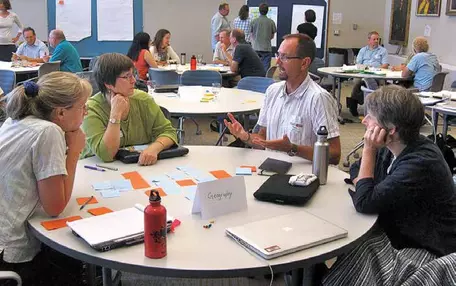InTeGrate: Interdisciplinary Teaching of Geoscience for a Sustainable Future
CAILIN HUYCK ORR (corr@carleton.edu), ALICE NEWMAN, and CATHRYN MANDUCA (cmanduca@carleton.edu) are, respectively, assistant director, (former) community specialist, and director of the Science Education Resource Center, Carleton College, Northfield, Minnesota.

InTeGrate is a five-year, NSF-funded STEM Talent Expansion Program (STEP) Center project that started in 2012. The STEP Center program enables "a group of faculty representing a cross section of institutions of higher education to identify a national challenge or opportunity in undergraduate education in STEM and to propose a comprehensive and coordinated set of activities that will be carried out to address that challenge or opportunity within a national context."
The first goal of InTeGrate is to develop modular curricula that are used to increase the Earth literacy of undergraduate students. This includes the large majority of students who do not major in the geosciences, those who are historically under-represented in the geosciences, and future K–12 teachers, such that they are better positioned to make sustainable decisions for our society. The second goal is to increase the number of majors in the geosciences and related fields who are able to work with other scientists, social scientists, business people, and policy-makers to develop viable solutions to current and future environmental and resource challenges.
InTeGrate involves multiple components that work to promote transdisciplinary learning within and beyond the geosciences. Our community of 102 material developers have created and are testing 33 modules and courses, including those that are targeted for introductory geology, for teacher preparation,and those that bridge learning about the Earth with disciplines outside of geoscience. Following InTeGrate's guiding principles, each teaching module:
- Addresses one or more geoscience-related
- grand challenges facing society
- Develops students' abilities to address
- interdisciplinary problems
- Improves students' geoscientific thinking skills
- Makes use of authentic geoscience data
- Develops students' system thinking skills
Nineteen completed modules and courses are now freely available online, with supporting materials for faculty: http://serc.carleton.edu/integrate/teaching_materials/modules_courses.html. InTeGrate principles and curricular materials are being implemented in 16 programs across the country. These programs are working to bring geoscience to a diverse range of disciplines, institutions, and networks, as well as provide the documentation and resources necessary to help other groups implement similar programs at the program-scale or larger.
To support broader use of InTeGrate ideas, materials, and models, InTeGrate is offering a variety of workshops and webinars that focus on the lessons learned through the project. Addressing issues from environmental justice to supporting diverse students in our programs, these professional development opportunities are open to all. Participants, including educators from across the disciplines (geoscience, environmental science, engineering, social science, humanities), come together to learn from one another around the unifying theme of teaching about the Earth in the context of societal issues.
To learn more about InTeGrate and how you can get involved, visit: http://serc.carleton.edu/integrate.

